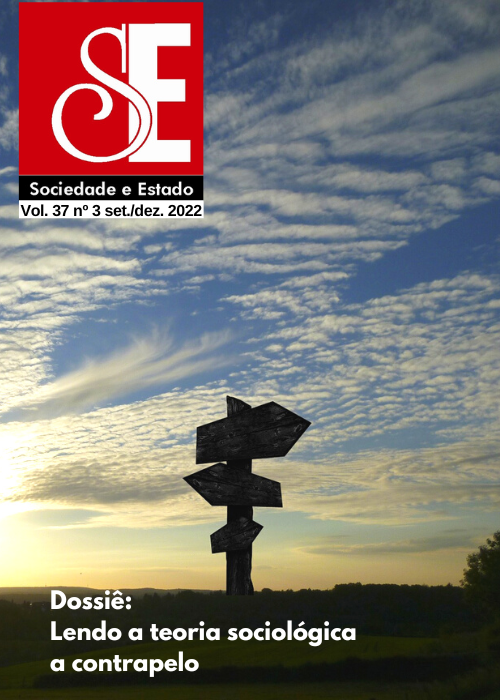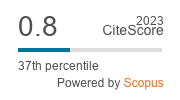Por uma ética da ontoformatividade: reflexões e proposições sobre a relação ontológica entre teoria e pesquisa na sociologia contemporânea do sul global
DOI:
https://doi.org/10.1590/s0102-6992-202237030006Palavras-chave:
Teoria Social, ontologia, teorias do sul, ontoformatividade, sociologia pós-colonialResumo
Ao partir da noção de que a teoria social que sustenta a disciplina da sociologia em escala global é definida e limitada pela matriz ontológica do sujeito moderno ocidental, o texto problematiza seus impactos para a investigação no Sul Global. A hipótese central é de que esta perspectiva limita as condições de possibilidade para a emergência de existências empíricas inauditas que renovem nossos escopos teóricos, tornando as pesquisas em contextos não hegemônicos conceitualmente irrelevantes. Ao reivindicar a adoção de uma relação simétrica e ativa entre teoria e pesquisa, o artigo propõe a construção da noção de ética da ontoformatividade. Uma postura teórico-metodológica que combina a produção das condições de existência do objeto (ontologia), com a própria investigação empírica. Deste modo, a disciplina estaria aberta à possibilidade de ampliação continuada das condições de existência e de composição da vida coletiva. O potencial desta ética é demonstrado por uma incursão pelos desafios propostos pela sociologia iorubá de A. Akiwowo.
Downloads
Referências
ABIODUN, Rowland. Oríkì and the making of an African sociologist: Akìwowo (Ifá priest who recites Ifá divination texts profusely by rote like pouring rain). Journal of Contemporary African Studies, v. 39, n. 3, p. 330-339, 2021.
ADEMOYO, Adeolu. Purpose, human sociality and nature in akiwowo’s sociology of knowledge: a realist interpretation. African Sociological Review/Revue Africaine de Sociologie, v. 13, n. 2, 2009.
ADESINA, Jimi O. Sociology and Yoruba Studies: epistemic intervention or doing sociology in the “vernacular”? African Sociological Review/Revue Africaine de Sociologie, v. 6, n. 1, p. 91-114, 2002.
ALATAS, Syed Hussein. The captive mind in development studies.Part 1. International Social Sciences Journal, v. 24, n. 1, p. 9-25, 1972.
______. The Weber thesis and South East Asia. Archives de Sociologie des Religions, p. 21-34, 1963.
ALATAS, Syed Farid; SINHA, Vineeta. Sociological theory beyond the canon. London: Springer, 2017.
ALBROW, Martin; KING, Elizabeth (Eds.). Globalization, knowledge and society: readings from international sociology. London: Sage, 1990.
ALMEIDA, Júlia; MIGLIEVICH-RIBEIRO, Adelia; GOMES, Heloisa Toller (Eds.). Crítica pós-colonial: panorama de leituras contemporâneas. Rio de Janeiro, 7 Letras, 2013.
AKIWOWO, Akinsola A. Indigenous sociologies: extending the scope of the argument. International Sociology, v. 14, n. 2, p. 115-138, 1999.
______. Responses to Makinde/Lawuyi and Taiwo. International Sociology, v. 6, n. 2, p. 243-251, 1991.
______. Universalism and indigenisation in sociological theory: Introduction. International Sociology, v. 3, n. 2, p. 155-160, 1988.
______. Contributions to the sociology of knowledge from an African oral poetry. International Sociology, v. 1, n. 4, p. 343-358, 1986.
______. Trend report: Sociology in Africa today. Current Sociology, v. 28, n. 2, p. 3-73, 1980.
______. The Role of Social Scientists in Africa: Further Reflections. International Social Science Journal, v. 28, n. 1, p. 198-201, 1976.
______. Status inconsistency in relation to social participation and political activity in a Boston Negro community: an application of the status inconsistency concept to the study of a local community. Tese de Doutorado - Boston University, 1961.
ANZALDÚA, Gloria. Borderlands/la Frontera: the new mestiza. San Francisco: Aunt Lute, 1987.
ARCHER, Margaret S. Sociology for one world: unity and diversity. International Sociology, v. 6, n. 2, p. 131-147, 1991.
BECK, Ulrich; LAU, Christoph. Second modernity as a research agenda: theoretical and empirical explorations in the “meta-change” of modern society. The British Journal of Sociology, v. 56, n. 4, p. 525-557, 2005.
BUTLER, Kathleen Julie. Teaching an indigenous sociology: a response to current debate within Australian sociology. Newcastle, AU: University of Newcastle, 2009.
BURAWOY, Michael. The last positivist. Contemporary Sociology, v. 40, n. 4, p. 396-404, 2011.
BURAWOY, Michael; CHANG, Mau-kuei; FEI-YU HSIEH, Michelle (eds.). Facing an unequal world: challenges for a global sociology, 3 v. Taipei: Academia Sinica, 2010.
COLLINS, Patricia Hill. Aprendendo com a outsider within. Sociedade e Estado, v. 31, n. 1, p. 99-127, 2016.
CONNELL, Raewyn. Contesting Northern knowledge: Akinsola Akiwowo and the worldwide struggle to change the social sciences. Journal of Contemporary African Studies, v. 39, n. 3, p. 340-352, 2021.
______. Gender, health and theory: conceptualizing the issue, in local and world perspective. Social Science & Medicine, v. 74, n. 11, p. 1675-1683, 2012a.
______. Transsexual women and feminist thought: toward new understanding and new politics. Signs: Journal of Women in Culture and Society, v. 37, n. 4, p. 857-881, 2012b.
______. Gender and social justice: Southern perspectives. South African Review of Sociology, v. 42, n. 3, p. 103-115, 2011.
______. Southern theory. The global dynamics of knowledge in social science. Cambridge, UK: Polity Press, 2007
______. Gender and power: society, the person and sexual politics. Hoboken, NJ: John Wiley & Sons, 1987.
CORONIL, Fernando. Beyond occidentalism: toward nonimperial geohistorical categories. Cultural Anthropology, v. 11, n.1, p. 51-87, Feb.1996.
COSTA, Sergio. Teoria por adição. Horizontes das ciências sociais: sociologia, p. 25-51. São Paulo: Anpocs, 2010.
CRENSHAW, Kimberlé W. On intersectionality: essential writings. New York: The New Press, 2017.
CRUICKSHANK, Justin. A tale of two ontologies: an immanent critique of critical realism. The Sociological Review, v. 52, n. 4, p. 567-585, 2004.
DE LA CADENA, Marisol. Earth beings: ecologies of practice across Andean worlds. Durham, NC: Duke University Press, 2015.
DOMINGUES, José Maurício. Beyond the centre: the third phase of modernity in a globally compared perspective. European Journal of Social Theory, v. 14, n. 4, p. 517-535, 2011.
EISENSTADT, Shmuel Noah. Multiple modernities. London: Routledge, 2017.
FEATHERSTONE, Mike ; LASH, Scott; ROBERTSON, Roland (Eds.). Global modernities. London: Sage Publications, 1995.
GO, Julian. Globalizing sociology, turning South. Perspectival realism and the Southern standpoint. Sociologica, v. 10, n. 2, 2016.
______. For a postcolonial sociology. Theory and Society, v. 42, n. 1, p. 25-55, 2013.
GUERREIRO-RAMOS, Alberto. A redução sociológica: introdução ao estudo da razão sociológica. Rio de Janeiro: Edições Tempo Brasileiro, 1965.
GITTLER, Joseph B. Social ontology and the criteria for definitions in sociology. Sociometry, v. 14, n. 4, p. 355-365, 1951.
HARAWAY, Donna. A manifesto for cyborgs: science, technology, and socialist feminism in the 1980s. In: ______. Feminism/postmodernism, p. 190-233. London: Routledge, 2013.
HENDRICKS, Jon; BRECKINRIDGE PETERS, C. The ideal type and sociological theory. Acta Sociologica, v. 16, n. 1, p. 31-40, 1973.
HOLBRAAD, Martin; PEDERSEN, Morten Axel. The ontological turn: an anthropological exposition. Cambridge, UK: Cambridge University Press, 2017.
HOLBRAAD, Martin; PEDERSEN, Morten Axel; DE CASTRO, Eduardo Viveiros. The politics of ontology: anthropological positions. Cultural Anthropology, v. 13, 2014.
HOUNTONDJI, Paulin J. Endogenous knowledge: research trails. Dakar: Codesria, 1997.
KARAKAYALI, Nedim. Two ontological orientations in sociology: building social ontologies and blurring the boundaries of the “social”. Sociology, v. 49, n. 4, p. 732-747, 2015.
KEIM, Wiebke. Comment on Julian Go. What are the criteria for truth in globalized sociology? A critical appraisal of go’s Southern standpoint approach. Sociologica, v. 10, n. 2, p. 1-8, 2016.
KOSIK, Karel. Dialectics of the concrete: a study on problems of man and world. Springer Science & Business Media, v. 52, 1976.
LAW, John. After method: mess in social science research. London: Routledge, 2004.
LAWUYI, Olatunde Bayo. Orí, Ayé and the ontogeny of society. Journal of Contemporary African Studies, v. 39, n. 3, p. 353-363, 2021.
LAWUYI, Olatunde B.; TAIWO, Olufemi. Towards an African sociological tradition: a rejoinder to Akiwowo and Makinde. International Sociology, v. 5, n. 1, p. 57-73, 1990.
LUKÁCS, Gyorgy. Para uma ontologia do ser social 1. São Paulo: Boitempo, 2015.
MAFEJE, Archie. Anthropology and independent Africans: suicide or end of an era? African Sociological Review/Revue Africaine de Sociologie, p. 1-43, 1998.
MAIA, João Marcelo. History of sociology and the quest for intellectual autonomy in the Global South: the cases of Alberto Guerreiro Ramos and Syed Hussein Alatas. Current Sociology, v. 62, n. 7, p. 1097-1115, 2014.
MAKINDE, M. Akin. Asuwada principle: An analysis of Akiwowo’s contributions to the sociology of knowledge from an African perspective. International Sociology, v. 3, n. 1, p. 61-76, 1988.
MAZRUI, Ali A. Towards diagnosing and treating cultural dependency: the case of the African university. International Journal of Educational Development, v. 12, n. 2, p. 95-111, 1992.
MBILINIYI, Marjorie; PARPART, J. Women and development in Africa. Comparative perspectives. New York: Dalhousie University, 1989.
MOL, Annemarie. The body multiple: ontology in medical practice. Durham, NC: Duke University Press, 2002.
______. Ontological politics. A word and some questions. The Sociological Review, v. 47, n. 1, p. 74-89, 1999.
MOOSAVI, Leon. Turning the decolonial gaze towards ourselves: decolonising the curriculum and “decolonial reflexivity” in sociology and social theory. Sociology, Jul. 2022.
NEVES, Fabrício Monteiro. A periferização da ciência e os elementos do regime de administração da irrelevância. Revista Brasileira de Ciências Sociais, v. 35, 2020.
NYAMNJOH, Anye-Nkwenti; MORRELL, Robert. Southern theory and how it aids in engaging Southern youth. The Oxford Handbook of Global South Youth Studies, 2021.
OOMMEN, T. K. Sociology for one world: a plea for an authentic sociology. Sociological Bulletin, v. 39, n. 1-2, p. 1-13, 1990.
OYEWÙMÍ, Oyèrónké. The invention of women: making an African sense of western gender discourses. Minneapolis, MN: University of Minnesota Press, 1997.
PAYNE, Mark W. Akiwowo, orature and divination: approaches to the construction of an emic sociological paradigm of society. Sociological Analysis, v. 53, n. 2, p. 175-187, 1992.
PRATT, Mary Louise. Modernity and Periphery. In MUDIMBE-BOYI, Elisabeth (Ed.). Beyond dichotomies: histories, identities, cultures, and the challenge of globalization. Albany, NY: State University of New York Press, 2012.
RODRÍGUEZ, Encarnación; BOATCA, Manuela; COSTA, Sérgio. Decolonizing European sociology. Transdisciplinary approaches. Surrey, UK: Ashgate, 2010.
ROSA, Marcelo C. How to stage a convergence between ANT and Southern sociologies? In: BLOK, Anders; FARÍAS, Ignacio; ROBERTS, Celia. The Routledge Companion to Actor-Network Theory, p. 210-219. London: Routledge, 2020.
______. Sociologias indígenas Iorubá: a África, o desconcerto e ontologias na sociologia contemporânea. Estudos Históricos, v. 32, p. 389-408, Rio de Janeiro, 2019.
______. Theories of the South: limits and perspectives of an emergent movement in social sciences. Current Sociology, v. 62, n. 6, p. 851-867, 2014.
ROSENBERG, M. Michael. The conceptual articulation of the reality of life: Max Weber’s theo-retical constitution of sociological ideal types. Journal of Classical Sociology, v. 16, n. 1, p. 84-101. 2016.
RUDY, Susan. Gender’s ontoformativity, or refusing to be spat out of reality: reclaiming queer women’s solidarity through experimental writing. Feminist Theory, v. 21, n. 3, p. 351-365, 2020.
SOLDATIC, Karen. Disability’s circularity: presence, absence and erasure in Australian settler colonial biopolitical population regimes. Studies in Social Justice, v. 14, n. 2, p. 306-320, 2020.
SZTOMPKA, Piotr. Another sociological utopia. Contemporary Sociology, v. 40, n. 4, p. 388-396, 2011.
TAVOLARO, Sergio Barreira de Faria. Interpretações do Brasil e a temporalidade moderna: do sentimento de descompasso à crítica epistemológica. Sociedade e Estado, v. 36, n. 3. p. 1059-1082, 2021.
TAIWO, Olúfémi. Akínsolá Akìwowo: an intellectual appreciation. Journal of Contemporary African Studies, v. 39, n. 3, p. 309-317, 2021a.
______. Akínsolá Akìwowo: an intellectual appreciation. Journal of Contemporary African Studies, v. 39, n. 3, p. 309-317, 2021b.
THERBORN, Goran. Entangled modernities. European Journal of Social Theory, v. 6, n. 3, p. 293-305, 2003.
VIVEIROS DE CASTRO, Eduardo. Perspectival anthropology and the method of controlled equivocation. Tipití: Journal of the Society for the Anthropology of lowland South America, v. 2, n. 1, p. 1, 2004.
VERRAN, Helen. Science and an African logic. Chicago, IL: University of Chicago Press, 2001.
WAGNER, Peter. Multiple trajectories of modernity: why social theory needs historical sociology. Thesis Eleven, v. 100, n. 1, p. 53-60, 2010.
Downloads
Publicado
Como Citar
Edição
Seção
Licença
Copyright (c) 2022 Sociedade e Estado

Este trabalho está licenciado sob uma licença Creative Commons Attribution-NonCommercial 4.0 International License.











